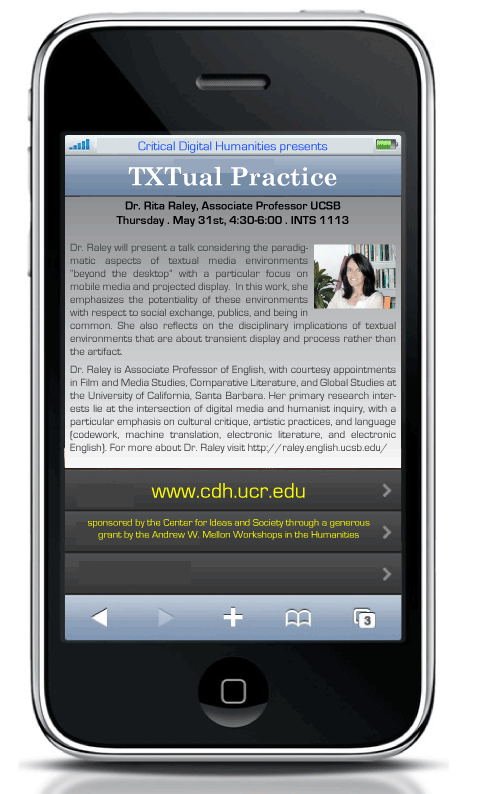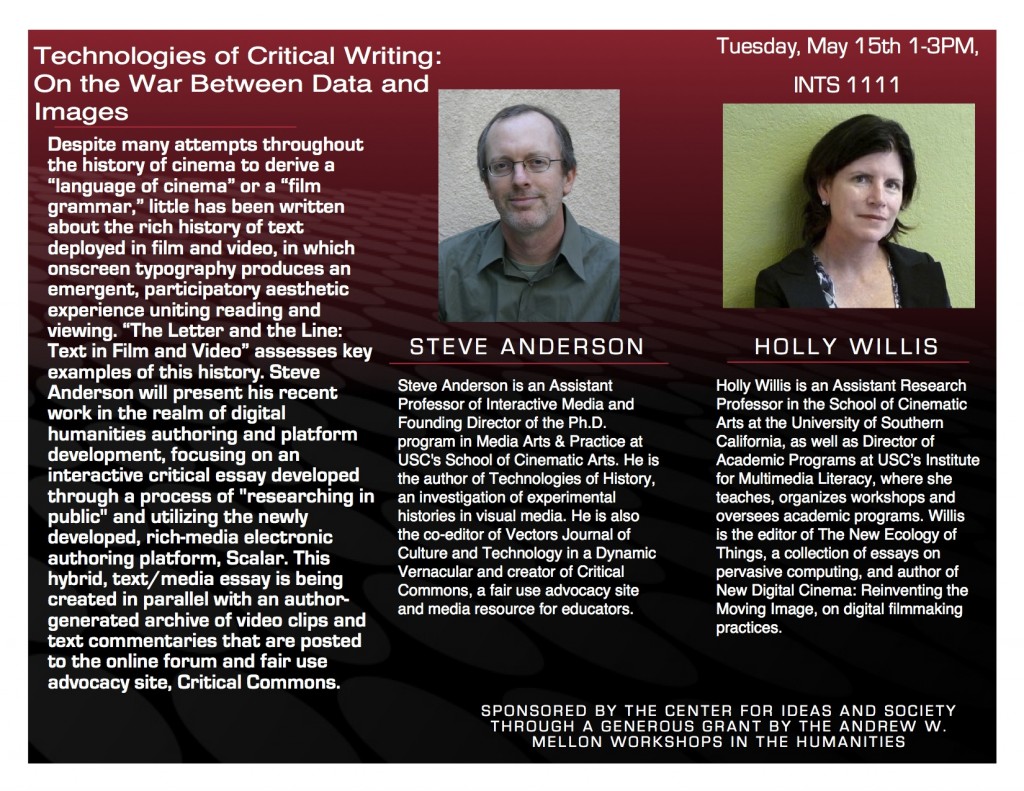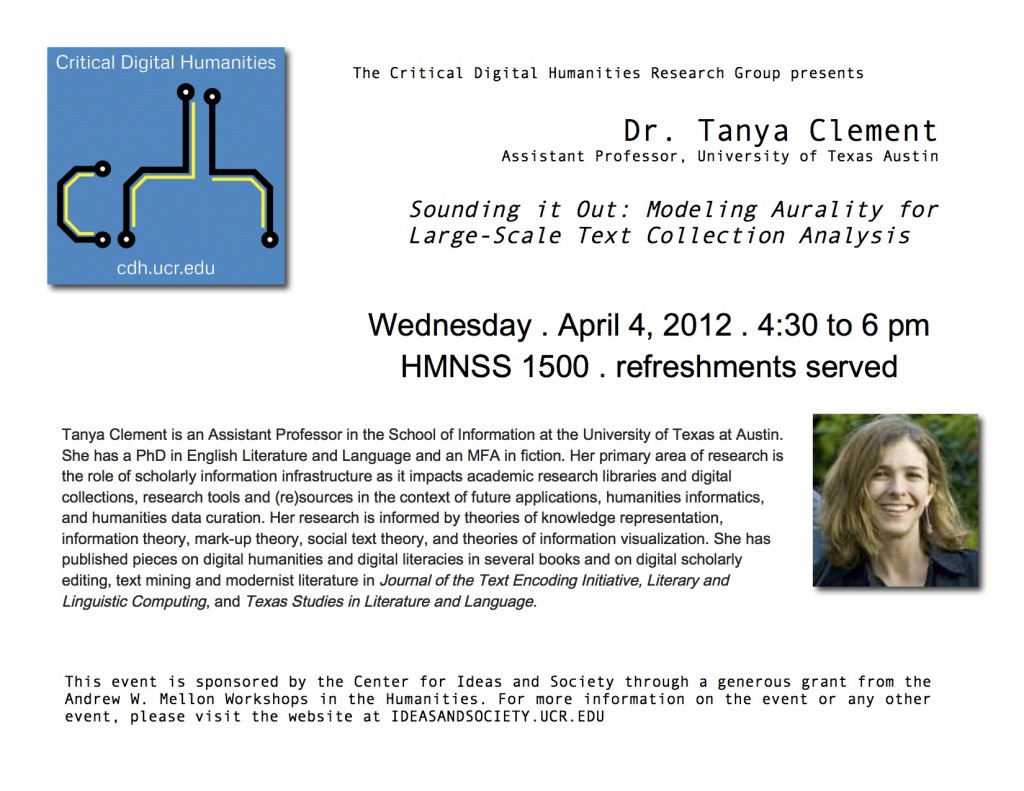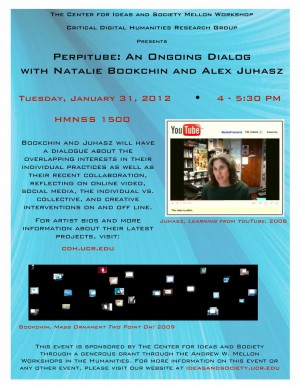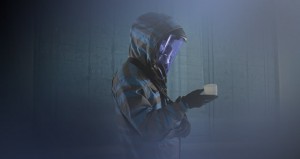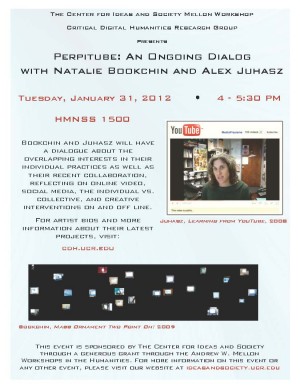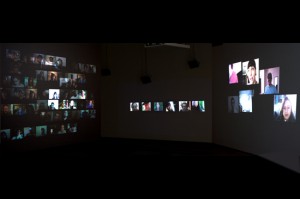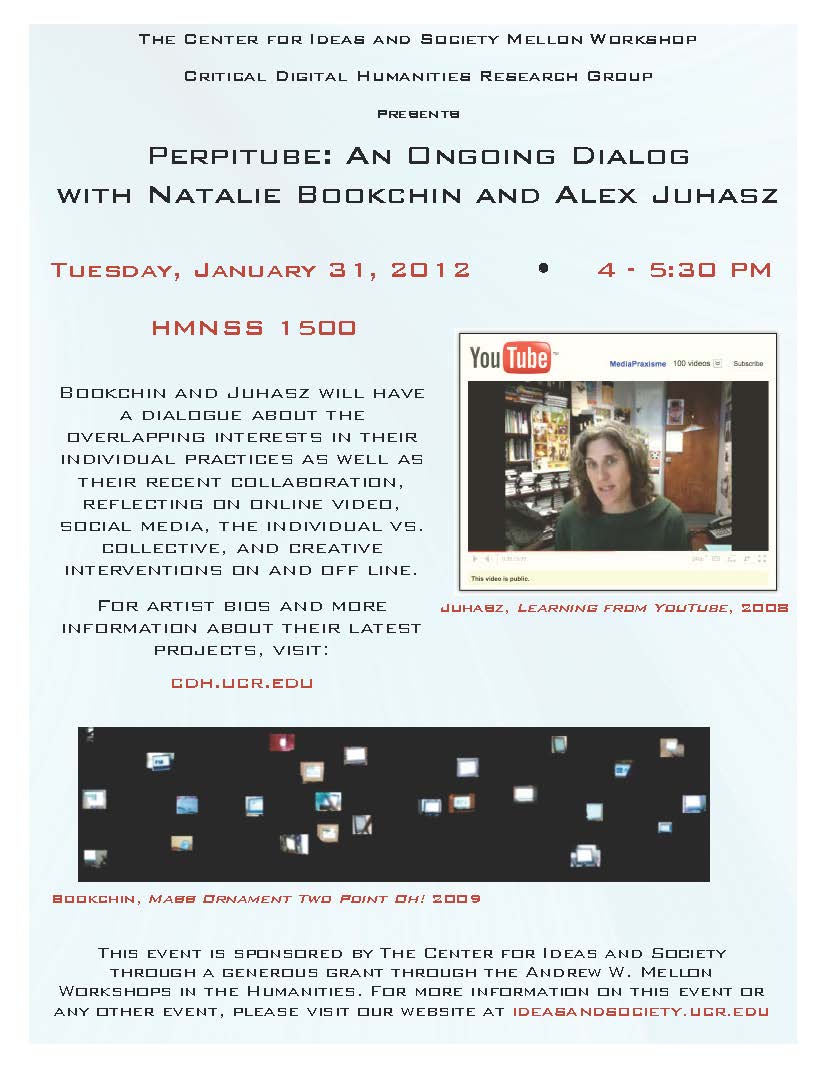Posts from the ‘CDH events’ Category
Sound Art and the Transborder Digital Memorial: Luz María Sánchez’ “2487” at the Riverside Art Museum
September 19th, 2012
Carolyn Schutten
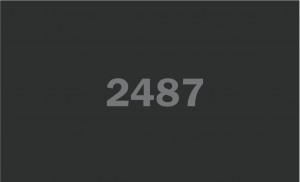 In conjunction with the Riverside Art Museum’s exhibition You Are Breathing in It: Alternative Art Practices (YABII), Luz María Sánchez’ 2487, a stereo installation from an 8-channel sound piece, is currently on exhibit in the RAM Alcove Hallway. The sound art installation was curated by Carolyn Schutten, a PhD student in public history from UCR, who took part in the Riverside Art Museum Student Curatorial Council (RAMSCC) pilot program.
In conjunction with the Riverside Art Museum’s exhibition You Are Breathing in It: Alternative Art Practices (YABII), Luz María Sánchez’ 2487, a stereo installation from an 8-channel sound piece, is currently on exhibit in the RAM Alcove Hallway. The sound art installation was curated by Carolyn Schutten, a PhD student in public history from UCR, who took part in the Riverside Art Museum Student Curatorial Council (RAMSCC) pilot program.
2487 speaks the names of the two thousand four hundred eighty seven people who died crossing the U.S./Mexico border . The work employs digital technology and sound as a means for transborder memorialization and protest, imposing the absence of those lost into the public sphere. Sánchez’ immersive sound environment remaps social history as the names of the deceased fly across the border through soundscape and digital media. Drawing from data acquired from activist websites, Sánchez created a sound map of names which she recorded digitally. Her final score, along with the database, has been exhibited widely but lives permanently on the world wide web, in commemoration and quiet protest. Sánchez’ work connects the digital and geographic landscape to the listener’s body, gaining entry through sound and transcending political and physical barriers.
Curator Carolyn Schutten will speak about 2487 and the curatorial process, along with the other RAMSCC students, during a panel discussion on September 21 at 6:00 pm. To RSVP please call 951-684-7111 or e-mail Exhibit Liaison Kathryn Poindexter at: ramexhibitions@riversideartmuseum.org.
2487 will be on exhibit from August 9 – September 26, 2012 in the Riverside Art Museum Alcove Hall. YABII will close on September 22, 2012.
For more information on Sánchez sound project, visit: www.diaspora2487.org
Luz María Sánchez’ 2487 was originally commissioned by Artpace San Antonio as part of the International Artist-in-Residence program New Works: 06.2, curated by Yuko Hasegawa, Chief Curator, Museum of Contemporary Art, Tokyo, Japan.
Please join us for one of the final events of our exciting digital year.
Dr. Rita Raley, Associate Professor at UCSB will present on the possibilities for social exchange in textual media environments, focusing on hand-held devices.
Thursday, May 31
4:30-6 pm
INTS 1113
Refreshments served!
Dr. Raley’s talk will move “beyond the desktop,” with a particular focus on mobile media and projected display. In this work, she emphasizes the potentiality of these environments with respect to social exchange, publics, and being in common.
She also reflects on the disciplinary implications of textual environments that are about transient display and process rather than the artifact. Dr. Raley is Associate Professor of English, with courtesy appointments in Film and Media Studies, Comparative Literature, and Global Studies at the University of California, Santa Barbara. Her primary research interests lie at the intersection of digital media and humanist inquiry, with a particular emphasis on cultural critique, artistic practices, and language (codework, machine translation, electronic literature, and electronic English).
For more about Dr. Raley visit: http://raley.english.ucsb.edu/
CDH event – Technologies of Critical Writing: On the War Between Data and Images
May 9th, 2012
Steve Anderson
Tuesday, May 15th 1-3pm in INTS 1111
Technologies of Critical Writing: On the War Between Data and Images
by USC professors: Steve Anderson and Holly Willis
Despite many attempts throughout the history of cinema to derive a “language of cinema” or a “film grammar,” little has been written about the rich history of text deployed in film and video, in which onscreen typography produces an emergent, participatory aesthetic experience uniting reading and viewing. “The Letter and the Line: Text in Film and Video” assesses key examples of this history. Steve Anderson of USC will present his recent work in the realm of digital humanities authoring and platform development, focusing on an interactive critical essay developed through a process of “researching in public” and utilizing the newly developed, rich-media electronic authoring platform, Scalar. This hybrid, text/media essay is being created in parallel with an author- generated archive of video clips and text commentaries that are posted to the online forum and fair use advocacy site, Critical Commons.
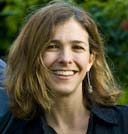
The Center for Ideas and Society Mellon Workshop
Critical Digital Humanities Research Group
Presents
Sounding it Out: Modeling Aurality for Large-Scale Text Collection Analysis
Wednesday, April 4th 4:30-6:00 PM HMNSS 1500
Dr. Tanya Clement is an Assistant Professor in the School of Information at the University of Texas at Austin. She has a PhD in English Literature and Language and an MFA in fiction. Her primary area of research is the role of scholarly information infrastructure as it impacts academic research libraries and digital collections, research tools and (re)sources in the context of future applications, humanities informatics, and humanities data curation. Her research is informed by theories of knowledge representation, information theory, mark-up theory, social text theory, and theories of information visualization. She has published pieces on digital humanities and digital literacies in several books and on digital scholarly editing, text mining and modernist literature in Journal of the Text Encoding Initiative, Literary and Linguistic Computing, and Texas Studies in Literature and Language.
This event is sponsored by the Center for Ideas and Society through a generous grant from the Andrew W. Mellon Workshops in the Humanities. For more information on the event or any other event, please visit the website at ideasandsociety.ucr.edu
(This is a re-post from the UC Humanities Forum)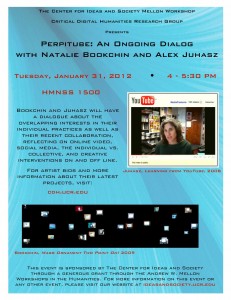
“[I]t’s important to remember that IT has not altered the fundamental mission of the humanities: to preserve, monitor, investigate, and rethink our cultural inheritance, including the various material means by which it has been embodied and transmitted.”—Jerome McGann
Like many humanities scholars, I received, not too long ago, a copy of MLA’s Profession 2011, which has a fairly extensive section on “Evaluating Digital Scholarship,” and from which I’ve borrowed the above epigraph. Around that same time, I attended an excellent event hosted by UCR’s Critical Digital Humanities research group (and sponsored by The Center for Ideas and Society, with funding through the Andrew W. Mellon Workshops in the Humanities, many thanks). So, in keeping with the idea of “the future of the humanities,” I want to review the event, here, within the digital humanities framework for which McGann’s quote argues. Read more
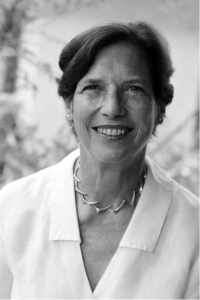
The Center for Ideas and Society Mellon Workshop
Critical Digital Humanities Research Group
Presents
Media, Self, and Relationships
With Patricia Greenfield
Wednesday, February 22, 3:00-5:00 PM INTS 1113
Patricia Greenfield, Ph.D., Distinguished Professor of Psychology at UCLA and Director of the Children’s Digital Media Center@Los Angeles, is author of Mind and Media: The Effects of Television, Video Games, and Computers (1984), subsequently translated into nine languages; coeditor of Effects of Interactive Entertainment Technologies on Development (1994); coeditor of Children, Adolescents, and the Internet: A New Field of Inquiry in Developmental Psychology (2006); and coeditor of Social Networking on the Internet: Developmental Implications (2008). Her empirical research on the developmental implications of interactive media has included action video games, massive multiplayer online role-playing games, teen chat rooms, and social networking sites.
Greenfield has held residential fellowships at Harvard University, Stanford University, and the School for Advanced Research on the Human Experience in Santa Fe. She is a recipient of the American Association for the Advancement of Science Award for Behavioral Science Research. In 2010 she received the Bronfenbrenner Award for Lifetime Contribution to Developmental Psychology in the Service of Science and Society from the American Psychological Association.
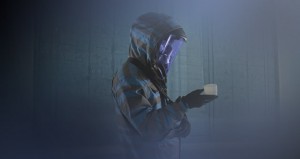 RENDER: New Construction in Video Art
RENDER: New Construction in Video Art
February 4-April 14
California Museum of Photography
http://www.cmp.ucr.edu/
RENDER: New Construction in Video Art explores the physical and phenomenological processed of video in contemporary art. It examines the intermingling of the materiality of technology and video in which artists use pixels and particle units from film to produce a new layer of mediated work. Used in computer editing programs, “rendering” is a required process to generate and solidify special effects and transitions. Consequently, the works in the exhibition apply artistic uses of translating visual data from analog to the digital, and vice versa.
Dr. Rita Raley, Associate Professor in the English Department of UCSB, and author of Tactical Media (Minnesota, 2009), has confirmed for an April 19 2012 talk.
We’ll post the room and time information as the event approaches.
We had to cancel the November 1 presentation by Alex Juhasz and Natalie Bookchin, but we’ve been able to re-schedule them for January 31 at 4 PM.
The event will be in HMNSS 1500 from 4:00-5:30pm, and refreshments will be served.
We’ll update site information as the event approaches.
This page archives our invitees for the quarter including links to their work, websites, and articles we will read in preparation for their talks.
11-1-11 . 4pm . HMNSS 1500 . refreshments served
This event has been rescheduled to January 31, 2012 from 4:00-5:30pm in HMNSS 1500
“Perpitube” with Alexandra Juhasz and Natalie Bookchin
Alex Juhasz is Professor of Media Studies at Pitzer College, Claremont, California. She will discuss her recent video-book Learning from YouTube published by MIT press and hosted by Vectors at USC.
Natalie Bookchin is a video and installation artist whose work is about “addressing conditions of mass connectivity and isolation and exploring the stories we are telling about ourselves and the world” (from her website). She is a member of the integrated media faculty at CalArts in Valencia.
Readings associated with this visit:
Juhasz, Alexandra. “Online Feminist Documentary Cyber-closet.” Media Fields Journal – Issue 3: Documentary and Space. Web. 04 Oct. 2011. <http://www.mediafieldsjournal.org/online-feminist-documentary-cy/>
“Out in Public: Natalie Bookchin in Conversation with Blake Stimson.” Rhizome. 11 Mar. 2011. Web. 04 Oct. 2011. <http://rhizome.org/editorial/2011/mar/9/out-public-natalie-bookchin-conversation-blake-sti/>
Additional Scholarship:
Tobias, James. Sync: Stylistics of Hieroglyphic Time. Philadelphia, PA: Temple UP, 2010. pages 213-221.
Reading group associated with this visit:
We will meet Tuesday, October 25 at 4:30pm in HMNSS 2212 to discuss these texts relative to non-textual scholarship and other research interests. There will be a film screening of the OWLs, a project in which Alex Juhasz was a participant.
From the website:
Raised in the shadow of a “pathological lesbian” films like THE FOX, THE CHILDREN’S HOUR and THE KILLING OF SISTER GEORGE, the OWLs once embraced the utopian vision of Lesbian Nation. Now, approaching middle age, the revolution has eluded their dreams. Caught between a culture that still has no place for them, and a younger generation indifferent to their contributions, the OWLs face an emotionally complex set of circumstances that have yet to be compassionately and truthfully addressed.
Proceedings from this visit:
Will follow the talk…

